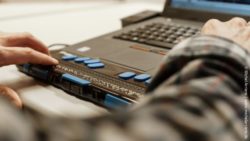REHACARE Newsletter
Social Media

European digital inclusion strategies
13/11/2019
The 2nd M-Enabling Forum Europe took place on September 19, 2019 at the Congress Center of Messe Düsseldorf during REHACARE. The conference demonstrated the importance of promoting digital inclusion and accessible and assistive technology for persons with disabilities and senior citizens.
November 2019: Quo vadis inclusion?
07/11/2019
Ten years ago, the UN Convention on the Rights of Persons with Disabilities came into force in Germany. There is still considerable criticism of the current state of its implementation. The hope for a more inclusive society has not yet been fulfilled. But what about the rest of Europe? REHACARE.com has set out on a search – for positive developments, but also for obstacles still to be overcome.
It is not only in digital form that the diversity of people must be recognized and taken into account!
07/11/2019
Sweden is a pioneer in many things. But the Scandinavian country does not represent Europe. However, there is also no country that can be regarded as a positive overall example in the topic of Inclusion. Susanna Laurin from Funka knows why digital accessibility is a way to participate and why research in the field of disabilities and information and communication technology is so important.
October 2019: Research & development
01/10/2019
Basic research, technology development, and the development of a prototype to a marketable product - these are the steps that innovations go through before we can use them. REHACARE.de has looked around which promising tools could soon conquer the market for blind people and how a FabLab project tries to implement digital participation for all.
Leveraging research and development to shape the future
01/10/2019
Whether it’s wheelchairs or prosthetics – there is an ongoing effort to continuously improve auxiliary aids and services. As a result, the standards of medical equipment also continue to change - always based on the latest developments and research results. That’s why REHACARE.com has taken a closer look at how trends like digitization and creative minds impact this industry sector.
The basis for innovation: research and development
01/10/2019
Basic research, technology development, and the development of a prototype to a marketable product - these are the steps that innovations go through before we can use them. REHACARE.de has looked around which promising tools could soon conquer the market for blind people and how a FabLab project tries to implement digital participation for all.
FabLabs: Learning digital competence and promoting participation
01/10/2019
People with disabilities often need custom-made or adapted items because disabilities are unique to each person. And sometimes the affected person is the only one who comes up with great ideas that are truly helpful in daily life. But not everyone has the knowledge or equipment to create their very own auxiliary aid. This is where so-called fab labs come into play.
Two innovative ideas expected to breathe new life into Braille
01/10/2019
Braille was invented nearly 195 years ago. The system has helped people to effectively participate at home and in society and acquire higher education ever since. It remains a reliable system that facilitates inclusion today. However, when it comes to Braille reader advancements, current technology is not nearly as up to date. Two projects plan to change that.
REHACARE 2019: everyone comes together at the market of endless opportunities
02/09/2019
Whether you are a professional, family member or a person with a disability – there’s something for everyone at REHACARE, the leading trade fair for rehabilitation, prevention, inclusion and care. Set to take place September 18 – 21, 2019, the doors of the exhibition halls in Düsseldorf will once again open to welcome anyone interested in auxiliary aids, innovations and expert information.
Labor force participation: How auxiliary aids can help make the workday easier
01/08/2019
Special tools, accessible software or a modified work environment – there are many ways to create a more accessible workplace for people with disabilities. Options range from conventional analog tools to digital solutions. But how can disability inclusion in the workplace be ensured – today and in the future?
Creating an accessible workplace: inclusive software for people with and without disabilities
01/08/2019
Optimized technical workflows that efficiently accommodate blind, visually impaired and sighted people – the inclusive software by Dräger & Lienert GbR makes it reality. In this REHACARE.com interview, Hansjörg Lienert explains how a small company in Marburg has managed to succeed in international markets and reveals why entrepreneurs sometimes have to take risks to thrive.
Parkinson's disease: Greater gait stability thanks to smart insoles
25/07/2019
Gentle vibrations delivered to feet alert users to dangerous situations as they walk and prompt a more normalized gait pattern. That’s the concept behind the sensory orthotic insoles by novapace. In this interview, Simon Staffa, project manager at novapace, explains how this technology can help people with Parkinson's disease and describes the opportunities digitization brings to rehabilitation.
Stroke: Digitalization of rehabilitation with Rewellio
27/06/2019
Mobile devices like tablets can help people with rehabilitation after a stroke – like with an app or virtual reality. Rewellio starts right here and wants to make therapy easier both for the patients and the physiotherapists. REHACARE.com talked to Georg Teufl, founder and CEO of Rewellio GmbH, about the advantages of his product and digitalization in general.
March 2019: Trend towards digitization – rehabilitation of tomorrow
01/03/2019
Whether with virtual reality glasses or on a movable treadmill in a virtual environment – the rehabilitation sector is increasingly being digitized. How this trend was already apparent at the last REHACARE and what the current status quo in research and healthcare is like, you can find out in our Topic of the Month March: Trend towards digitization – rehabilitation of tomorrow.
Virtual and diverse: Digitization of rehabilitation and physiotherapy
01/03/2019
From walking canes with built-in GPS sensor and SOS emergency call function to robot-assisted therapy sessions to virtual reality applications – digitization is making its way into the rehabilitation sector. We have reviewed the role this topic already played at REHACARE 2018 and highlighted some of the research projects that currently focus on this subject.
Rehabilitation: Gait analysis and training in Virtual Reality
01/03/2019
New technology provides new opportunities. What pertains to so many areas of life also applies to the field of rehabilitation and physiotherapy. REHACARE.com examined whether and how virtual reality, visual analytics, and machine learning can enhance and shape the healthcare sector in the future – especially when it comes to gait analysis.
Trend towards digitization – rehabilitation of tomorrow
01/03/2019
Whether with virtual reality glasses or on a movable treadmill in a virtual environment – the rehabilitation sector is increasingly being digitized. How this trend was already apparent at the last REHACARE and what the current status quo in research and healthcare is like, you can find out in our Topic of the Month March: Trend towards digitization – rehabilitation of tomorrow.
Digitization and the new opportunities it brings to the healthcare sector
01/03/2019
Is it already too late for the digitization of healthcare? How does Germany compare to other countries in this setting? What opportunities and threats does big data involve? And why could uniform digital patient care lead to unimagined success, especially when it comes to the rehabilitation sector?
MemoreBox by RetroBrain: Where rehabilitation meets fun
20/12/2018
Doing something good for your health in a playful and fun way – that sums up the concept of health games. "It does not have to be grueling, boring and dreadful to maintain or regain your health," says Manouchehr Shamsrizi. He co-founded RetroBrain and developed the MemoreBox – an easy-to-use gaming console for aging adults, designed to keep them physically and mentally healthy and fit.
Leicht. Bewerben.: "Simple Language can break down online barriers and communicate content so everyone can understand"
22/11/2018
Writing an informative job application can be hard but it’s crucial if you want to find a job. Especially young people with learning disabilities often struggle with this feat. That’s why the KulturLife non-profit organization has launched the "Leicht. Bewerben" project (English: Applying. Made Simple).
"TiPY is designed to accomplish the same things with one hand as you can with a standard two-handed keyboard"
25/10/2018
Microsoft has led the way and launched an adaptive controller to enable people with physical disabilities to have nearly the same complete gaming experience as people without disabilities. Mattheaus Drory achieved a similar result. In this interview with REHACARE.com, he admits that he initially didn’t necessarily have people with disabilities in mind when he developed his one-handed keyboard.